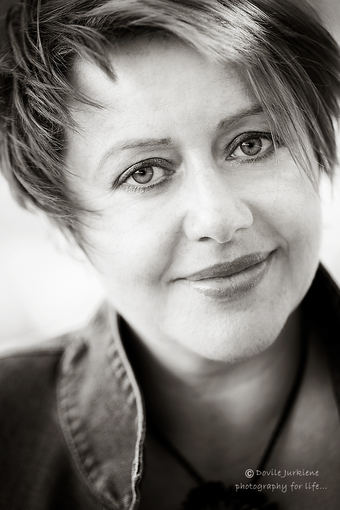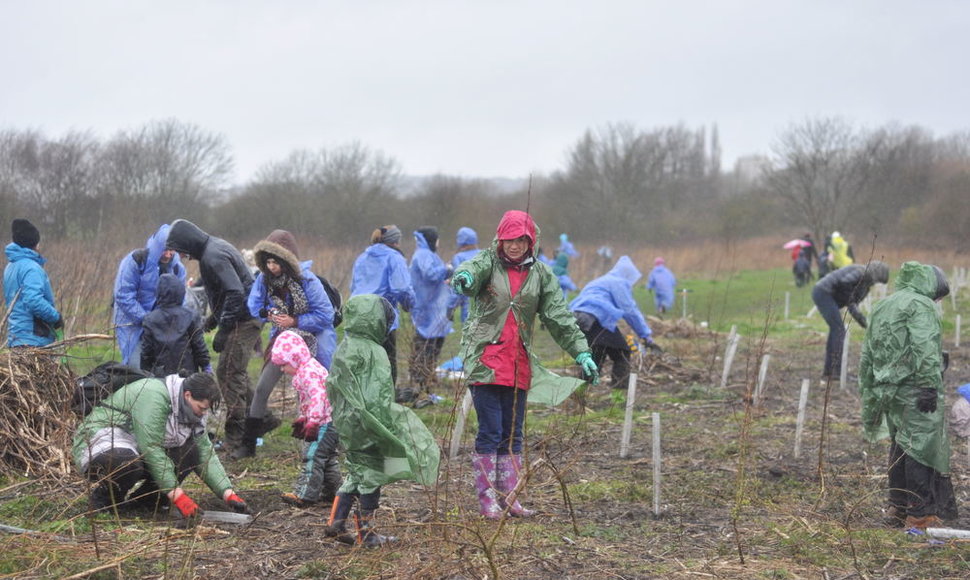The founder of the school, Virginija Stukaitė-Laniauskienė, came to England six years ago. The Laniauskai family does not fit the common stereotype of Lithuanian emigrants who resettle in search of a better-paid job – Virginija says she simply wanted to have an adventure.
“I had never thought I'd leave Lithuania – I had no reason to. My husband was working in a several-family business, while I was a deputy-director of one of Vilnius shopping centres. We did not seem to be in want of anything,” Stukaitė-Laniauskienė smiles.
 |
| D.Jurkienės nuotr./Virginija Stukaite-Laniauskienė |
It was 2006. Economic forecasts were promising golden years ahead, banks were giving away loans left and right, the quality of life curve was bending upwards. Marius, Virginija's husband, was not satisfied, however – he craved to try something new.
“Marius decided to change his line of work and thought, why not try it in England? Saulė had just been born and I was on maternity leave – and so I said, absent-mindedly: do it. And thus our journey began,” she recalls.
Roller-coaster of jobs
Having decided to check out a foreign country, the family did not expect to be greeted with open arms. However, Marius Laniauskas soon found a job and, several months later, his wife and nine-month-old daughter Saulė joined him.
“I did not even think about what I'd do. I am an active person, so I had no doubts I would find an occupation for myself,” Stukaite-Laniauskienė recalls. The woman, who has a degree in Lithuanian and folk studies from Klaipėda University, offered her services to a local Lithuanian-language newspaper, InfoZona. Several months later, she received a call with a request to do a story on Lithuanian Mardi Gras.
Virginija did not confine herself to this one job. In September 2007, she started working at a Lithuanian school in west London.
She had spent over two years as a deputy principle of the school before deciding to set up a school of her own in Croydon: “It had a sizeable Lithuanian community, but no Saturday school. I was a mother of a small child myself, so I felt that there was a need for one.”
Brits celebrate for fun
Word of mouth as well as all-powerful Facebook helped spread the news about a new Lithuanian folk culture and drama school in Croydon.
“Parents, who take their kids to English kindergartens and schools, were interested in having them learn Lithuanian. Not only to understand and speak, but to read and write. Besides, many feel it is important that their children know Lithuanian traditions.
“We do not concentrate on kids alone, but on entire families – it is not like parents drop off their little ones at school and leave. The first lesson is always for the entire family: we play games, learn nursery rhymes, dances, endless fairy tales – so that parents can repeat them at home,” Stukaitė-Laniauskienė shares her methods.
She has learnt that the easiest way to win children's attention is by exposing them to differences between cultures: “We do not present Lithuanians as an exceptional people unique on this Earth – instead we use workshops to draw their attention to certain archaic details that we have preserved in our festivals and customs. After all, the Brits, too, have a pancake day, but they celebrate it just for fun, as they themselves say, without paying too much attention to symbolism.”
Loyal to the Queen and Lithuania
The school community gathers to celebrate not just ethnographic festivals but national holidays, too. On 16 March, they planted 105 trees in South Norwood Park.
“We wrote a project and the municipality granted us a 600-pound grant to promote environmental awareness among Lithuanians. We used some of the funds to plant the first Lithuanian park. Officially, we planted trees for the occasion of Her Majesty's birthday, but in our hearts we celebrated the Lithuanian Independence Day.
“Some 60 people came. It was incredibly cold and raining. We planted the trees in an hour and then, all soaking wet, ran home,” Stukaitė-Laniauskienė laughs.
Patriot daughter
The Lithuanian Saturday school is now housed in a building that serves as a children centre from Monday to Friday. “There are schools that have their own premises – and that is my dream, too,” she admits.
On workdays, Stukaitė-Laniauskienė works for two British organizations that take care of kids with special needs.
“Authorities can give some funding for a family with a kid like that to hire help. My job is to talk to parents and explain the rules of how to hire someone to take care of their kid, how to report to the authorities,” she explains.
She also dedicates some of her time to special-needs kids under five: “I must pay a certain number of visits to a family, to bring special toys and teach the parents how to use them to stimulate their kids' speaking, social skills, etc.”
The Laniauskai family have no plans of returning to Lithuania yet – they feel well-integrated into the British public life.
Saulė is turning seven in June, she is already going to school, so Virginija and Marius do not wish to cause stress by moving her to an environment she is not familiar with: “We are not saying, however, that we will not come back ever. I love Lithuania and the Lithuanian language very much and I passed it on to my daughter. She is a true patriot – Saulė draws pictures for Lithuania and is already fantasizing about how she will be flying to visit her grandparents this summer. We will be spending our vacation in Lithuania – there is simply no way around it.”
Saturday school map
According to data from 2011-2012, there are 163 Lithuanian-language non-formal learning institutions outside the country. The schools operate in 32 countries and have 6,269 pupils.
Non-formal learning institutions by country:
36 in the USA
21 in the UK and Kaliningrad Oblast (Russia)
8 in Ireland, Germany, and Sweden
7 in Belarus
5 in Australia and Poland
4 in Canada and Norway
3 in Denmark, Russia, Finland, Ukraine, and Latvia
2 in Argentina, Georgia, Spain, Italy, and Switzerland
1 in Armenia, Belgium, the Czech Republic, Egypt, Estonia, Iceland, China, Moldova, Kazakhstan, France, and Uruguay
In addition, there are 11 Lithuanian-language formal learning institutions: 2 in Belarus, 1 in Latvia, 6 in Poland, 1 in Russia, and 1 in Germany. (Data by the Ministry of Foreign Affairs)













